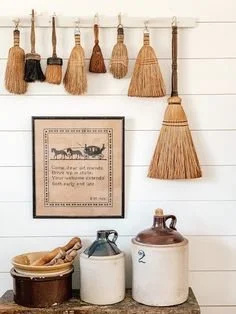Systems
I was never one to examine my systems as a young person, though I’ve always loved a solid routine. Price, on the other hand, is system-oriented. He gets that from his Mom. Wanda has a system for everything. Her Dad was an electrician, so I think there is a strong engineering gene in their family. Price loves examining a system to ensure it functions smoothly and efficiently or creating a new system to overcome an issue. I come to him with everything from minor irritants to major problems, he listens and creates a system to deal with it. It’s a huge blessing.
Here’s the deal, whether we realize it or not, we have a system for everything we do from cooking to cleaning, to meal planning, to family schedules, to holidays, we have a system. The question we should be asking as homemakers is what is the system and is it working?
1) See the System: Do the hard work of paying attention. How the laundry is done, meals selected, weekend plans scheduled, Sunday prepared for, and the house cleaned are our systems. We start by noting our thoughts and movements. Don’t change anything, simply observe.
2) The Good, the Bad, and the Ugly: Once we see our systems, we look for efficiency and frustration. Is our system working? Are we constantly behind on the dishes? Are our weekends too full? Are we always late for church? Is meal planning a nightmare? Does the laundry get washed and folded and put away all on the same day? Are favorite meals regularly enjoyed? Is the bathroom normally clean? Take intentional note of pain points and good workflows.
3) Adjust: Make slow adjustments. Dishes never being done might be what we want to tackle. Don’t change everything at once! Start by just paying attention to the dishes, then tweak one thing, like when or how often the dishwasher is run. Observe if that one change helped or not. Take the time to adjust to the new thing before it is embraced or tossed.
4) Help: Find a sounding board to talk through the whole thing and either to get feedback or to look at the system from a different perspective. This shakes things loose. (Yes, I just said go grab coffee with a girlfriend and leave your dishes in the sink. ☺)
5) Time: Big systems or even big projects are overwhelming. Break them down and track the time. I struggled with dishes for a long time, then one day, facing a huge sink of dirty plates and counters of pans, overwhelmed and ready to quit, I watched the time. 20 minutes. I got everything loaded, washed, and counters wiped down in 20 minutes. Not hours. Not days. 20 minutes. After that, I kept an eye on the clock when I did dishes and found that the job was bigger in my head than it was to accomplish. The more I tackled the dishes in short bursts throughout the day, the shorter the bursts became. Watch the time and the systems to make sure instincts are accurate because sometimes they are not.
A couple of pointers or issues related to particular struggles:
Rigid: Life as a homemaker is one of constant change and constant routine. (Don’t ask me how that works, it just is.) If we have inflexible systems we will make ourselves and our families nuts and bitter. We need to know our systems backward and forward so we know the baseline and the optimum. That allows us to bow and bend without breaking. We need to be familiar enough with our systems to know that bending this week means extra work next week. We need to know what they are and what they can be: “I want a more involved system, but the phase I’m in right now can’t work with that.” Systems must be flexible.
Frantic: Systems are our handmaid, not our taskmasters. As I’ve worked on systems, both in our business and home, I’ve adjusted what my goals are. Efficiency is good, but it can also make you frantic. We might need to use timers or timers might be the worst thing for us. A system that requires massive multi-tasking might sound good but be a nightmare in reality. Our systems don’t crack the whip! We are free and in charge. Our systems work for us.
Systems are a huge help in overcoming our weak points and making sure things get done. When I catch myself struggling in any area, I start by checking my system or lack thereof. Much of the time, I either have a bad system or I’m using an out-of-date one that no longer works for my current life. Systems do require paying attention. I’m a big one for daydreaming and daydreaming is fine and good and even helpful. But at times we all need to be present and sharp and pay attention to our hearths so that we can be a help to our husbands, households, and churches.
System Example: Clean the Whole House Every Day Cleaning Method or Looking for Dirt Method
Go through your house looking for dirt. When you see it, you clean it.
The idea is that once I implement the system, the bulk of my time is spent only observing my home. Not everything is dirty every day or even every week.
I started by “cleaning” the guest room. I looked at ceilings, walls, corners, the bed frame, under the bed frame, ceiling fans, floors, baseboards, art, shelves, everything, even the door frames, and I cleaned. The next day, I looked at it all again. None of it needed anything. So I added the master bathroom. The next day I looked over the guest room and master bathroom and added the furniture and art in our bedroom. Each day, I go over yesterday’s spaces and add a new space or item.
Because of my health, I’ve neglected some spaces for a while. Each space has to be semi-deep cleaned before it can go in the rotation. At first, I predicted it would take me a month to put the whole house into the system. Oh silly me. I now think it will take however long it takes. The more I clean, the more I see that needs cleaning. I’m seriously considering hiring a crew to deep clean the house once or twice a year just to jumpstart everything while I maintain it.
Here is the exciting part, I’ve been using this system (look, clean, add a new space or thing) since October and it has yet to take me longer than 30 minutes to clean no matter how many new spaces or things I’ve added into the rotation.
My long-term goal is to have each space a designated day. Tuesday is the main living area. Wednesday is bedrooms. Thursday is the kitchen. Bathrooms will probably go in every day.
Even going at a snail’s pace, I’m reaping great benefits already. Remember that HearthKeeping is “the purposed, intentional, prudent, and discerning management of households.” Well, cleaning with the Looking for Dirt System fits with that mentality. It forces me to be purposed. I have to SEE my home and can’t just skate by with my head off on other things. I have to slow down and pay attention.
The house has started to feel “always clean” instead of always dirty or always needing to be cleaned. I don’t clean on Sunday or Monday, but the house still feels clean at its roots by Tuesday. It may be spectacularly untidy, but it feels clean as I move about.
This system gives me tangible and practical knowledge about my home. We all know bathrooms and kitchens need daily cleaning, but I didn’t know or think about the floor of my closet as being one of those high-traffic places. I didn’t notice how badly the bathroom walls needed to be scrubbed. With this system, I’ve learned about places in my home that I haven’t considered as dirty. I have tangible evidence to support my gut instinct or evidence my gut needs retraining.
As I’m developing this system and slowly slowly deep cleaning my house, I’ve made some side observations:
-places like the kitchen can’t wait for me to add it in as a place to clean. I still have to do dishes and wipe down counters multiple times a day. I don’t include that in the Looking for Dirt System.
-I’m not sure how “deep” I want to go in the cleaning. I’m not going to empty my pantry looking for dirt or dust the walls every day. Price suggested that looking for dirt is thinking about how long it’s been since that thing was last done. This is a two-layer system. First, look for obvious dirt. Second, make sure I stay aware of the oddball cleaning so that it gets done. If I see dirt I clean it.
-This can flex. There have been days I just didn’t get to cleaning or had a flare-up and couldn’t do it. Missing a day doesn’t break the system, but the system does work better if I don’t skip days.
-I’m not sure if this would work in a busy household with kids and pets, but I do think the principle can be used. I can see this as being a training tool to help kids learn to clean. The whole family would need to be on board for this to work. That takes time, training, and patience. You have to tweak, test, try, and be purposed about including kids in the workflow. Remember, start small, go slow.
Systems are one of the greatest tools in our tool chest of tending. They’re how we keep this thing called home grinding along. They’re how we keep things from getting missed or lost or forgotten. Everyone, even the more fly-by-the-seat-of-your-pants homemakers have systems. The goal is to see them, test their legitimacy, tweak slowly, and be better keepers and tenders because of labor. Let’s roll up our sleeves, tie back our hair, and get to work!
If you are interested in reading my adventure story, Stoneheart Hunt, featuring a woman invested in her home and family, go here.




